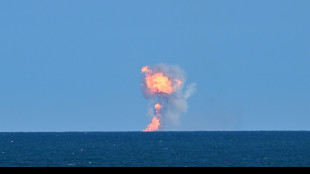
-
 Asian markets fluctuate as traders weigh geopolitical tensions
Asian markets fluctuate as traders weigh geopolitical tensions
-
'An inauspicious day': the landmines ruining Myanmar lives

-
 UN to vote again on Gaza ceasefire, US plans unclear
UN to vote again on Gaza ceasefire, US plans unclear
-
Japan's manga powerhouse 'Dragon Ball' turns 40

-
 Japanese, Koreans bottom of global love life survey
Japanese, Koreans bottom of global love life survey
-
Son blames 'mistakes' after South Korea held by Palestine in qualifier

-
 Japan ramps up tech ambitions with $65 bn for AI, chips
Japan ramps up tech ambitions with $65 bn for AI, chips
-
Lights, action, melodrama! Silent films get new reel at London haven

-
 Myanmar led world in landmine victims in 2023: monitor
Myanmar led world in landmine victims in 2023: monitor
-
ICC to sentence Timbuktu war criminal

-
 Ugandan opposition figure Besigye 'kidnapped', says wife
Ugandan opposition figure Besigye 'kidnapped', says wife
-
Australia's Jason Day eyes more major glory after resurgence

-
 Machu Picchu security boosted after visitors spread human ashes
Machu Picchu security boosted after visitors spread human ashes
-
Popovic hails Australia character in 'crazy' World Cup qualifier

-
 Taliban govt clearing 'un-Islamic' books from Afghanistan shelves
Taliban govt clearing 'un-Islamic' books from Afghanistan shelves
-
Argentina beat Peru as Uruguay hold Brazil

-
 Asian markets struggle as traders weigh geopolitical tensions
Asian markets struggle as traders weigh geopolitical tensions
-
Tatum stars as Celtics end Cavaliers unbeaten start

-
 Hurting India under pressure in blockbuster five-Test Australia series
Hurting India under pressure in blockbuster five-Test Australia series
-
'They killed her dream': Israel strike leaves woman footballer in coma

-
 Iraq holds its first census in nearly 40 years
Iraq holds its first census in nearly 40 years
-
Iraqis face tough homecoming a decade after IS rampage

-
 Russian net tightens around last civilians left in eastern Ukraine
Russian net tightens around last civilians left in eastern Ukraine
-
Olympic champion Tebogo aims to inspire next generation of African athletes

-
 Valencia on target as ten-man Ecuador upset Colombia
Valencia on target as ten-man Ecuador upset Colombia
-
'Rust' to premiere three years after on-set shooting

-
 Strike at French cognac maker Hennessy over measures in China spat
Strike at French cognac maker Hennessy over measures in China spat
-
Xi, Lula meet in Brasilia to 'enhance ties'

-
 SpaceX fails to repeat Starship booster catch, as Trump watches on
SpaceX fails to repeat Starship booster catch, as Trump watches on
-
'I have left a legacy': Nadal retires from tennis

-
 US recognizes Venezuela opposition's Gonzalez Urrutia as 'president-elect'
US recognizes Venezuela opposition's Gonzalez Urrutia as 'president-elect'
-
European powers, US seek to censure Iran at UN nuclear watchdog board

-
 UNAIDS chief says husband, Ugandan opposition figure Besigye, 'kidnapped'
UNAIDS chief says husband, Ugandan opposition figure Besigye, 'kidnapped'
-
Nadal's sensational career ends as Netherlands defeat Spain in Davis Cup

-
 US announces talks with Israel over civilian casualties in Gaza
US announces talks with Israel over civilian casualties in Gaza
-
SpaceX fails to repeat Starship booster catch, as Trump looks on

-
 G20 summit ends with Ukraine blame game
G20 summit ends with Ukraine blame game
-
Trump appoints TV celebrity 'Dr. Oz' to key US health post

-
 European stocks fall on Ukraine-Russia fears, US focused on earnings
European stocks fall on Ukraine-Russia fears, US focused on earnings
-
Last-gasp Szoboszlai penalty rescues Hungary draw with Germany

-
 Germany, Netherlands draw as Nations League group stage ends
Germany, Netherlands draw as Nations League group stage ends
-
Hong Kong tycoon Jimmy Lai takes witness stand in collusion trial

-
 Guardiola set to extend stay as Man City boss - reports
Guardiola set to extend stay as Man City boss - reports
-
Minnows Botswana hold Egypt to qualify with Mozambique, Tanzania

-
 Inter Miami coach Martino leaving club for 'personal reasons' - club source
Inter Miami coach Martino leaving club for 'personal reasons' - club source
-
Chinese man sentenced to 20 months for Falun Gong harassment in US

-
 Hong Kong court jails 45 democracy campaigners, drawing condemnation
Hong Kong court jails 45 democracy campaigners, drawing condemnation
-
'I did it for Rafa': Alcaraz after keeping Spain Davis Cup dream alive

-
 Alcaraz keeps Spain and Nadal Davis Cup dream alive
Alcaraz keeps Spain and Nadal Davis Cup dream alive
-
Trump names China hawk Howard Lutnick commerce secretary


As threats rise, Israelis turn to home bomb shelters
Israeli couple Aviva Pertzov and Jeff Lederer put off building a bomb shelter for years. But now, with rockets falling and threats rising, they are finally fortifying their home.
Attached to their house in Tel Mond, 30 minutes north of Tel Aviv, a solid, reinforced concrete room is emerging from behind a wooden mould -- strong enough to protect them and their grandchildren from a major blast.
When it is finished, this "safe room" will have white-painted walls, a sofa and a tiled floor, and a single window with a heavy metal shutter that closes across it with a clang.
"In previous times (of conflict), every time there was a moment where we said maybe we should build a shelter at home, we did nothing," Pertzov, a psychologist, said at their home in central Israel.
"This time, when (attacks) seemed to be getting closer to our area, then I told myself 'I can't go on like this'."
Northern Israel has been peppered by rocket and drone attacks from Lebanon's Hezbollah militants during the Israel-Hamas war in Gaza, which has raged since October 7.
Iran fired a flurry of missiles in April -- its first direct attack on Israel -- and is again threatening retaliation after Hamas's leader was killed in Tehran last month.
- 15-second warning -
With Iranian proxies active in Iraq and Syria, and Iran-backed Huthi rebels launching attacks from Yemen, Israelis are feeling threats on many fronts.
"We now worry more, because Hezbollah can reach us with their missiles," said 79-year-old Lederer, a family doctor.
"We are also afraid of being shot at by Iran."
The increasing range and sophistication of weapons has slashed reaction time to just a few seconds in the riskiest areas, near the Lebanese and Gaza borders.
Back in the 1950s, when the first public shelters were built, the sirens would sound 30 minutes before impact -- "enough time even to take a cup of coffee", said Lieutenant Colonel Moshe Shlomo, head of engineering at Israel's civil defence force, the Home Front Command.
Now, Israelis have 15 to 90 seconds, depending on where they live, to reach safety once the siren wails or a government-relayed alert blares from their phones.
For that reason, authorities are urging residents to build safe rooms in their homes, knowing that scrambling to a public or shared shelter simply takes too long.
"The threat level in Israel is very high," Shlomo told AFP at a military base near Tel Aviv, where an unexploded Iranian ballistic missile that fell in the Dead Sea in April is displayed at a road junction.
"We have other countries that are threatening us with missiles and ballistic missiles."
He added: "Those (safe) rooms save lives. We've seen it in this war."
- 'It causes concern' -
The safe rooms are designed to withstand a ton of explosives going off at a range of 15 metres (yards), and are air-tight with filtered ventilation in case of chemical or biological attack, Shlomo said.
The cost of building such a safe room varies approximately between $30,500 and $56,000.
Since Hamas's October 7 attack that triggered the war, when Israelis were attacked, kidnapped and killed in their homes, the heavy blast doors on new safe rooms are lockable from the inside.
However, about 55 percent of Israeli households do not have safe rooms, according to official estimates, because of either cost, lack of space, fatalism or obstinacy.
"There's a lot of older people who say, 'I don't want anything, I've been here 80, 90 years and I'm going to survive no matter what'," Shlomo said.
"We try to convince them. Some religious people don't want to protect themselves because they trust in God."
To persuade more people to install safe rooms, the Home Front Command has slashed the turnaround time for building permits to 14 days, processing about 4,500 applications in the past seven months.
For Pertzov and Lederer, their grandchildren were what finally persuaded them to build a shelter.
"We have many grandchildren and they come to sleep here, because they are not living nearby," said Pertzov.
"So it's kind of like a sense of duty and it causes a lot of concern."
O.Ortiz--AT
